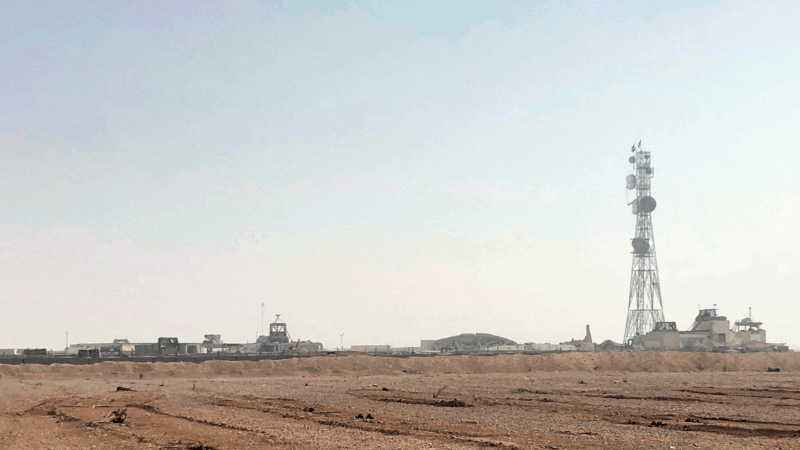Alabama and the Oil Spill: Gulf Fish Numbers Up
Since the oil spill in the Gulf of Mexico, marine scientists have come upon a surprising finding: more fish. Researchers at the Dauphin Island Sea Lab report dramatic increases in some species. But as Gigi Douban reports, the seafood industry is responding to the news with a wave of skepticism.
Student researchers at the Dauphin Island Sea Lab load up a boat with some essentials. It’s about two hours to their destination in the Gulf of Mexico: T-35, so named because the water’s 35 meters deep. They’re going to collect thousands of samples of tiny arthropods (shrimp and crabs are an example), then count them at the lab.
Counting marine life isn’t anything new. But when the BP oil spill hit, the Sea Lab ramped things up. They expected fewer sea creatures, a marine life wasteland. But instead, they found something very different.
“For a number of species there was as much as 300% increases in the numbers of fishes we were catching,” says John Valentine, chair of university programs at the Dauphin Island Sea Lab. “Tiger sharks and sandbar sharks increased dramatically in the last six months or so. Croaker, spots, speckled trout, things like that are also increasing in abundance in our area.”
Which begs the question: How, after more than 200 million gallons of oil are dumped into the ocean, do you end up with more fish?
“It may just be that we’re far enough away from the injury site not to have detected the big impacts,” says Valentine.
That is, the oiliest sections of the Gulf were near Louisiana, so most of those fish migrated to coastal Mississippi and Alabama.
But perhaps the best explanation, Valentine says, is that for months after the spill no one was allowed to fish. The federal fishing closure lasted almost six months. And so, the theory goes, fish had a rare opportunity to thrive.
But business owners in the gulf say the effects of the fishing closure haven’t been all good. Take Jimmy Bayley. He owns Bayley’s Seafood, half-way between Mobile and Dauphin Island.
Bayley cooks mostly mullet and shrimp at his restaurant, which researchers say have remained steady or only slightly decreased. But he says in the months following the spill, he had trouble getting his hands on other staples like crab meat not because of any population shifts, but because no one was out crabbing.
“I had crab meat, if you could find it. Problem was you couldn’t get nobody that was crabbing,” complains Bayley.
Even so, keeping his restaurant stocked hasn’t been nearly as much of a problem as getting people in the door. Because even if some fish are thriving in the wake of the oil spill, people are still afraid to eat it. Bayley says business is down about 70%.
“Slow. Dead. Dead…Like this time we do fish and grits on Wednesday night, lots of fried mullet. We usually feed 100 to 125 people. Right now we’re feeding like 40, and it’s people just I think are scared.”
Gary Skinner, a shrimper on Dauphin Island, says because of all the anxiety surrounding Gulf seafood, fishermen collectively cringe anytime the Sea Lab releases new findings. Skinner sells shrimp at his retail store, where two young women rinse and pop the heads off of hundreds of shrimp a day, by hand.
Skinner says even seemingly good news – like the increase in fish populations – has been bad for business.
“They’re making our customers think that, hey, we’re going to get shrimp at 50 cents a pound, they’re jumping out of the water. But that’s not the case.”
He says most days, there are so few shrimp to catch that it’s not even worth firing up the boat.
“We might get only two days a week that we can actually make it worthwhile dragging. The rest of the time it would be not even enough to pay for the fuel.”
And it’s these other economic factors, like the cost of fuel and the fact that people aren’t buying seafood, that are in a sense extending the fishing ban, months after the government lifted it.
Like others in the seafood industry, Skinner is skeptical that fish populations exploded because fishermen were forced to back off. He’s doubtful because the Sea Lab’s research is funded with $5 million of BP money; money that was paid to the state of Alabama, which the governor designated for research.
But John Valentine of the Sea Lab says there’s no conflict of interest. “There are absolutely no strings attached to that money by BP.”
He says his team can’t yet say for sure what effect the oil might’ve had on marine life. It could be that fish at the larval stage are more susceptible to toxins. And scientists won’t know that for at least another year.
~ Gigi Douban, February 4, 2011
Epstein files fallout takes down elite figures in Europe, while U.S. reckoning is muted
Unlike in Europe, officials in the U.S. with ties to Epstein have largely held their positions of power.
Four people on NASA’S Crew-12 arrive at the International Space Station
The crew will spend the next eight months conducting experiments to prepare for human exploration beyond Earth's orbit.
American speedskater Jordan Stolz wins second Olympic gold with 500-meter race victory
With the win, Stolz joins Eric Heiden as the only skaters to take gold in both the 500 and 1,000 at the same Olympics.
US military reports a series of airstrikes against Islamic State targets in Syria
The U.S. military says the strikes were carried out in retaliation of the December ambush that killed two U.S. soldiers and one American civilian interpreter.
5 European nations say Alexei Navalny was poisoned and blame the Kremlin
In a joint statement, the foreign ministries of the U.K., France, Germany, Sweden and the Netherlands say Navalny was poisoned by Russia with a lethal toxin derived from the skin of poison dart frogs.
It’s a dangerous complication of pregnancy — but a new drug holds promise
Researchers celebrate early results of a drug that may become the first treatment for a serious complication of pregnancy called preeclampsia. It's got the potential to save many lives.






